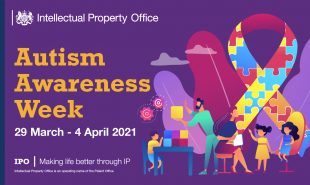This week we are marking World Autism Awareness Week, which leads up to World Autism Awareness Day on Friday 2nd April. In this article we want to raise awareness of autism, understand why it is important and look at what the IPO does to support its autistic members of staff.

You may also hear people call autism:
- ASD (Autism Spectrum Disorder – the current medical term)
- ASC (Autism Spectrum Condition – used by many who do not like the term ‘disorder’)
- Asperger Syndrome (a term that was previously used when diagnosing autistic individuals with average or above average intelligence – sometimes described as ‘high-functioning’ autism)
What is Autism?
Autism is a lifelong neurodevelopment disability that affects roughly 1 in 100 people in the UK. It is often diagnosed in childhood, but some people are diagnosed later in life. It is not known why people are autistic; our understanding of autism, the way it affects people, and the ways in which we diagnose and support individuals is improving as more research is done about the condition.
Autism affects people in different ways and no two people with autism are the same. For someone to be diagnosed with autism, two key areas of difficulties are communication & social interaction and repetitive & restrictive behaviours. Additionally, autistic people often have different sensory experiences.
Communication & social interaction
Autistic people may avoid eye contact when talking to you. They may struggle to understand abstract concepts, sarcasm and tone of voice. They may not understand the unwritten rules for social interaction, such as what topics are okay to discuss in office conversations, how to start a conversation or when it is the right time for them to talk.
Repetitive & restrictive behaviours
Many autistic people use routines to organise their day-to-day life. When these routines are disrupted, it can be difficult for autistic people to understand what they do. Some autistic individuals use repetitive movements to calm themselves. This is sometimes called ‘stimming‘ (such as using a fidget cube).
Different sensory experiences
Autistic people can be over or under sensitive to sensory experiences such as touch, light, temperature, smell, taste, sound. As a result, some may seek out extremely bright lights as they need that sensory input. Equally, they may wear ear protectors or noise cancelling headphones to reduce auditory input. Often autistic people struggle with the feel of certain materials or labels in clothes.
Autism strengths
Autism can also be associated with strengths in the following areas:
- high levels of concentration
- reliability, conscientiousness and persistence
- accuracy, close attention to detail and ability to identify errors
- technical ability, such as in IT
- detailed factual knowledge and an excellent memory.
Why is awareness important?
Autism awareness is important, especially in the workplace. Only 20% on autistic people are in employment compared to half of all disabled people and 8 in 10 non-disabled people.[1] One of the reasons for this is that traditional recruitment processes do not enable autistic people to successfully communicate their skills and potential. Also, when they are recruited, autistic people can struggle with office environments and unwritten expectations.
Unfortunately, there is still stigma surrounding autism. This means that many people do not feel comfortable disclosing their diagnosis or seeking an assessment for themselves or their child.
By increasing awareness of autism, we hope that more people will feel comfortable to seek and disclose their diagnosis, access any support they might need and feel at ease talking about autism.
There are lots of things you can do to help autistic people at work and in the wider world. Every autistic person is different. If possible, it is best to find out from them what support they would like. But some examples are:
- Be specific and avoid ambiguous language like metaphors and analogy
- Initiate conversations
- Do not be offended, or think they are not interested, if an autistic person does not look at you when talking
- Break down big tasks into small steps
- Ask closed questions instead of open ones (e.g. “Did you see your parents this weekend?” instead of “What did you do this weekend?”).
What the IPO does to support autistic people
At the IPO the iThink network supports neuro-divergent individuals, including autistic colleagues. The network runs support meetings and awareness training. It also provides advice and support for managers of autistic colleagues.
The IPO also works closely with the National Autistic Society to provide support for autistic staff and training courses for all staff members.
Here are some resources if you would like to learn more about autism:
- What is autism? - NHS (www.nhs.uk)
- What is autism - NAS (National Autistic Society)
- Information about autism | Ambitious about autism
[1] Outcomes for disabled people in the UK - Office for National Statistics (ons.gov.uk)
Recent Comments